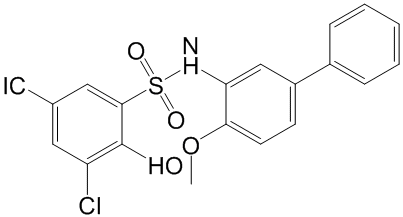All AbMole products are for research use only, cannot be used for human consumption.

BMS303141 blocks lipid synthesis (IC50 = 8 μM in HepG2 cells). Under identical incubation conditions, BMS-303141 showed no cytotoxicity up to 50 μM, indicating the observed inhibition of lipid synthesis was not a result of compound-induced cytotoxicity. BMS303141 Lowers plasma glucose and triglycerides in a mouse model of hyperlipidemia. BMS303141 is Orally bioavailable.

J Cell Mol Med. 2024 Mar;28(6):e18129.
SIRT2-mediated deacetylation of ACLY promotes the progression of oesophageal squamous cell carcinoma
BMS303141 purchased from AbMole
| Cell Experiment | |
|---|---|
| Cell lines | |
| Preparation method | |
| Concentrations | |
| Incubation time | |
| Animal Experiment | |
|---|---|
| Animal models | BALB/c nude mice (4‐5 weeks old) injected HepG2 cells |
| Formulation | saline |
| Dosages | 5 mg/kg/d for 8 days |
| Administration | gavage |
| Molecular Weight | 424.3 |
| Formula | C19H15Cl2NO4S |
| CAS Number | 943962-47-8 |
| Solubility (25°C) | DMSO ≥ 20 mg/mL |
| Storage |
Powder -20°C 3 years ; 4°C 2 years In solvent -80°C 6 months ; -20°C 1 month |
[2] Ma Z, et al. J Lipid Res. A novel direct homogeneous assay for ATP citrate lyase.
| Related Products |
|---|
| PCL-PEG-MAL
PCL-PEG-MAL is an amphiphilic block copolymer consisting of polycaprolactone (PCL), polyethylene glycol (PEG) and maleimide (MAL) functional groups. PCL-PEG-MAL is used in targeted delivery systems, surface modification of nanomaterials, functionalisation of biomaterials and biosensing technologies for specific chemical linkages or biomolecular immobilisation. |
| DSPE-PEG-Streptavidin
DSPE-PEG-Streptavidin is an important biocoupling molecule widely used in biomedical research, especially in drug delivery, targeted therapies, immunodiagnostics and biosensors. Through the specific binding between streptavidin and biotin, DSPE-PEG-Streptavidin can help to achieve efficient loading and targeted action in targeted delivery systems. In addition, the molecule is widely used in molecular imaging and bioassays, especially for molecular recognition using the strong affinity between streptavidin and biotin in assay platforms that require high sensitivity and specificity. |
| E7107
E7107 is a first-in-class precursor messenger ribonucleic acid (pre-mRNA) spliceosome inhibitor. |
| KL044
KL044 is a stabilizer of the clock protein cryptochrome (CRY). KL044 is a potent chemical probe with a pEC50 value of 7.32, leading to the extension of the circadian period and repression of Per2 activity. |
| 2-(2-Methylphenoxy)-4H-1,3,2-benzodioxaphosphorin 2-oxide
2-(2-Methylphenoxy)-4H-1,3,2-benzodioxaphosphorin 2-oxide is a biochemical material that can be used in scientific research. |
All AbMole products are for research use only, cannot be used for human consumption or veterinary use. We do not provide products or services to individuals. Please comply with the intended use and do not use AbMole products for any other purpose.


Products are for research use only. Not for human use. We do not sell to patients.
© Copyright 2010-2024 AbMole BioScience. All Rights Reserved.
